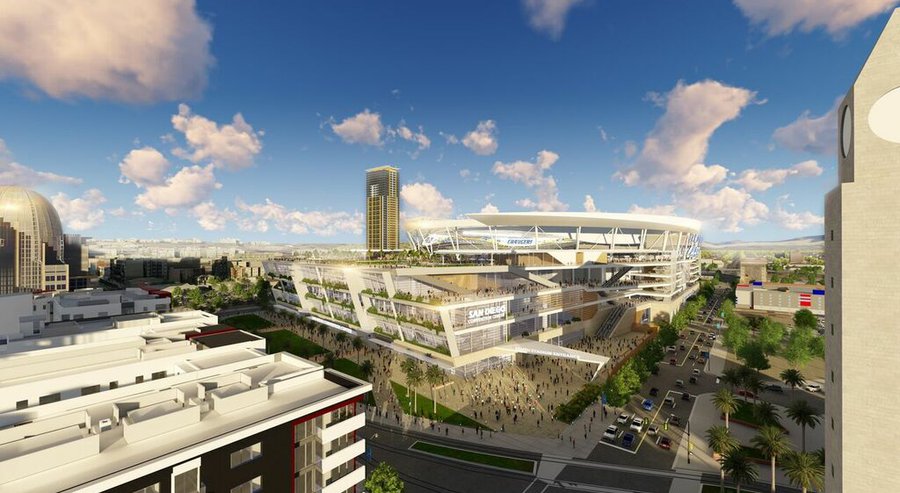After a long wait and aggressive lobbying from both sides, San Diego mayor Kevin Faulconer is backing a new downtown stadium/convention center for the San Diego Chargers.
In the campaigning both for and against the proposal, which is on November’s ballot as Measure C, Faulconer has been seen as a key endorsement. Those in San Diego’s business community who are against the plan saw the mayor as a potential ally, while the Chargers sought Faulconer’s endorsement as a way to give the proposal more political clout.
Thus far, the proposal from the team to raise the hotel tax from 12.5% to 16.5% to fund the public share of a $1.8 billion project has proven controversial. Many in the tourism industry have criticized the plan, as have other groups and organizations, and the San Diego Padre previously expressed concern about the parking they would lose as the result of the stadium/convention center’s development.
Ultimately Faulconer agreed to give his endorsement after the Chargers made a series concessions. Three of them cover broad financial terms, as the Chargers will pay for certain costs over the current estimate, will not use money from the city’s general fund, and agree to allow tourism marketing money to stay at its current rate. The San Diego Union-Tribune has a full rundown of the other agreements the Chargers made to ensure Faulconer’s endorsement, including provisions preventing them from leaving San Diego until stadium bonds are paid off and requiring them to replace parking that would be lost as the result of the facility’s construction.
Obtaining the mayor’s endorsement is certainly a win for the Chargers, but the proposal will in all likelihood require two-thirds approval from voters, a tall task in any political climate. Leading up to Faulconer’s announcement, it had seemed that an endorsement of the stadium/convention center could, if nothing else, keep talks between San Diego and the Chargers going even if the proposal falls short at the ballot. More from the Union-Tribune:
Support from Faulconer, who was easily re-elected in June and has strong ties to the local business community and other powerful interests, could boost the measure’s chances of success on Nov. 8.
And if the measure fails, the working relationship forged between Faulconer and team officials during months of negotiations on the concessions could help the city and the Chargers quickly begin work on finding another stadium solution.
“This is about working toward common goals that will get solutions for the public good,” said Faulconer, whose relationship has been strained with the Chargers since they tried to move to Los Angeles last year and abruptly ended stadium negotiations with him. “We put aside differences to find common ground.”
While the Chargers have the option to move to Los Angeles–an option that could be extended–recent comments from owner Dean Spanos indicated that the team could look at other solutions in San Diego if this proposal fails. However, Spanos ruled out the possibility of building a stadium in Mission Valley, the section of San Diego where the team’s Qualcomm Stadium is located.
RELATED STORIES: Chargers, Opponents Lobby Faulconer; Padres Express Reservations About Chargers’ Plan; City Attorney Criticizes Citizens’ Plan; Chargers Meeting With Citizens’ Plan Advocates;Convadium Facing Local Scrutiny; Chargers Begin Stadium Initiative;Chargers Pitch “Convadium”

